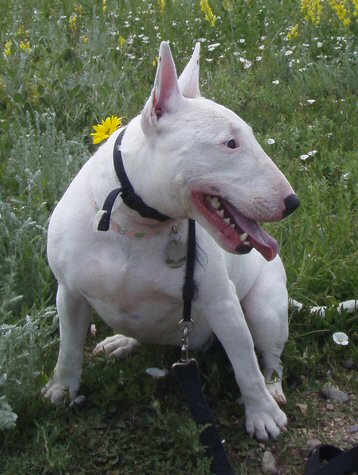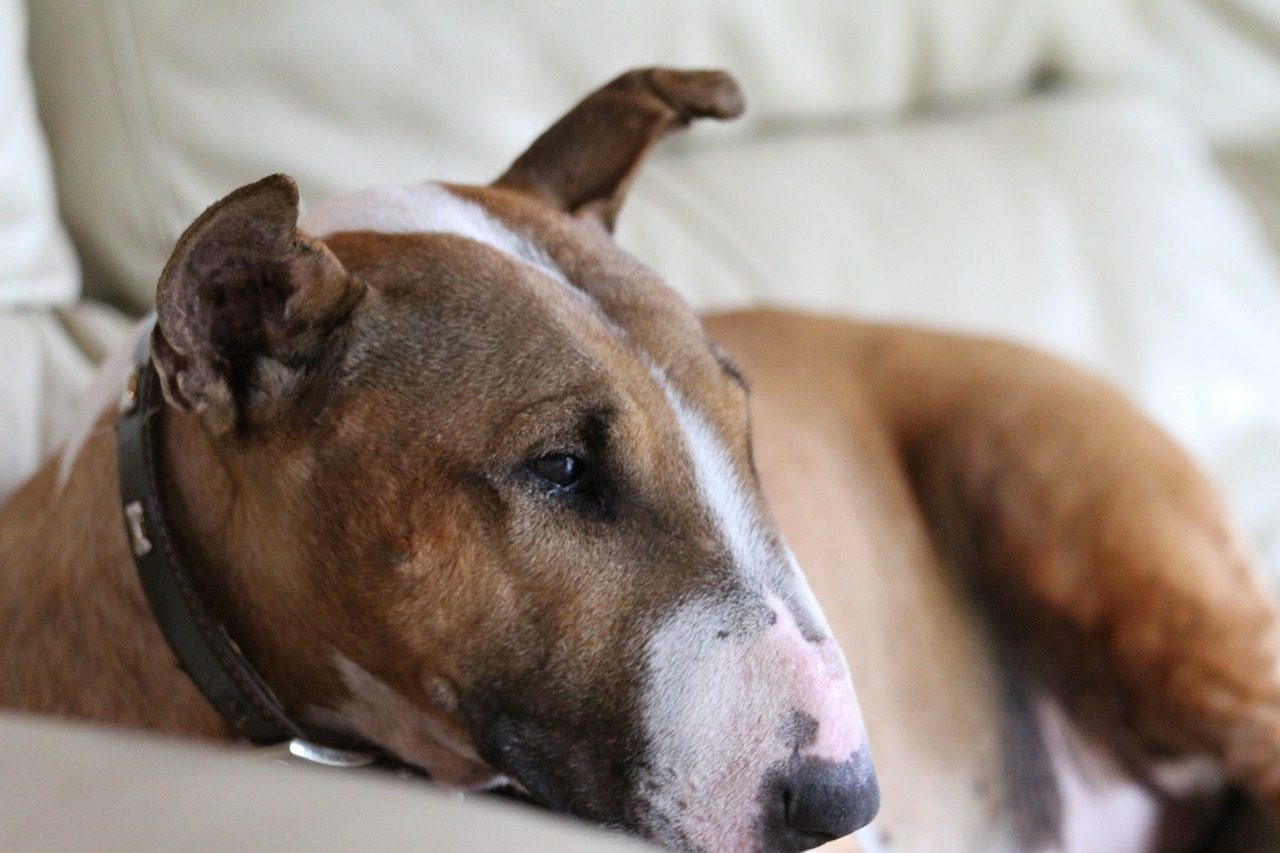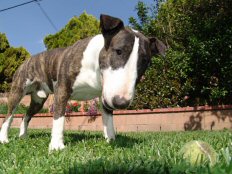PLEASE NOTE: Dog Garden Flags are currently unavailable. Please check back later. Thanks for your interest.
Bull Terrier
and
Miniature BT

| Trainability | |
| General Breed Health | |
| Easily Housebroken | |
| Low Maintenance | |
| Good w/Other Pets | |
| Non-Shedding | N/A read below |
“Some of our greatest historical and artistic treasures we place in museums; others, we take for walks.”.”
- Roger Caras
Every Dog is an Individual
The paragraphs below will describe the general characteristics of a typical Bull Terrier. Genetics, socialization, environment and other factors will also contribute to disposition, intelligence, size, etc.

Friendly- The Bull Terrier is a loving dog in family life and has a very sweet disposition, but they can be scrappy with other animals.
They do very well with other pets and are more tolerant of children when properly socialized. The earlier you start socializing, the better.
Watch Dogs- They make great watch dogs! A Bull Terrier will not be shy about sounding bark alarms. For safety's sake discourage overzealous defending of territory, etc.
Size- Bullies are short, but compact and very stout. A miniature can weigh anywhere from 25 to 33 pounds while standard male bull terriers can weigh up to 65 pounds. Standard females weigh about 10 pounds less when fully grown.
Trainability- Because of their strong terrier traits, training isn't always easy. They are eager to please and want to be good dogs. House training is easily learned by these dogs, in general, but for obedience, a little insurance never hurts. Learn some (bull-terrier-Friendly) basic training techniques here.
Loyalty- Bullies are faithful, affectionate and loyal companions. While independence is a character trait for many BT's, separation anxiety is a major issue for others.
Excitability- Excitability levels run high in bullies. Even the most well behaved bull terrier or miniature bull terrier should be supervised closely around children. Their tolerance has it's limits.
General Breed Health- High risk of poorly bred and puppy mill dogs in this breed if due diligence in choosing a responsible breeder in not exercised. This means visiting the breeder, making sure her dogs are bred "in house" and dogs are not kept in cages in her garage, barn, etc. or at another location separate from her home. Puppy mills dogs and dogs from irresponsible backyard breeders are more prone to the genetic health risks below.
NOT non-shedding- We do have a whole page devoted to non shedding dog breeds, but a bull terrier is not one of them.
Other Pets and Children- Regarding other pets, socializing early and often is highly recommended if possible. This is another area where choosing a responsible breeder will benefit you immensely. Breeding dogs with good character traits is a priority for responsible breeders. Adoption is another good way of getting a dog that suits your family and lifestyle. Adopting a adult dog means you'll already know if the dog is tolerant of other animals and children.

With the popularity of small dogs increasing, so too has the population of displaced and unwanted animals. There is probably a Bull Terrier Rescue Group near you. Why not consider adoption first.
More about The Bull Terrier and Miniature Bull Terrier
Training Difficulties- They are clearly intelligent, but
also have a mind of their own... and they will demonstrate regularly if
you allow it. Never turn to harsh training methods or hit a dog for
'no-nos'.
Chasing Instincts- Ever see a dog on a leash running
furiously, but dragging the leash behind him? Was there a frantic owner
on the chase calling after him? It may have been a bull terrier and it
could be yours if you don't keep a tight grip on the leash. Lots of dogs
are lost or stolen this way... or worse. Never walk without a leash.
Separation anxiety is common-
Destructive chewing, incessant barking and having "accidents" on your
furniture are only a few of the signs your dog is 'missing you'. This is
probably not the breed for you if you work long hours and would have to
leave him home alone.
High Energy Level- This is an energetic breed that
requires a lot of exercise to stay healthy, happy and fit. Expect to
stay busy. BT's are best suited for people with the same energy level.
Health Issues-
Bull Terriers will eat anything. This is actually a medical condition known as pica. Bowel obstruction from swallowing foreign objects is common for bullies and sometimes even requires life-saving surgery. Puppies run a greater risk, but they don't necessarily ever grow out of it. Being 'eaters' they are also prone to obesity.
Allergies- Fleas and other allergens can cause mild to severe reactions in bullies. Food, detergents, grass, etc. can also cause irritation to their sensitive skin. FAQ Learn more about dog allergies and the symptoms and treatment here.
Patellar Luxation is a painful joint condition that causes kneecaps to pop in and out of place. BT's aren't as prone to this as they are to joint dysplasia, but it's still a matter of concern for this breed.
Hip Dysplasia is a developmental subluxation of the hip joints which can eventually lead to arthritis and/or lameness. It's causes are genetic as well as environmental. Severe cases often require surgery.
Elbow Dysplasia-According the Orthopedic foundation for animals, 33.3 percent of Bull Terriers have or will acquire this joint disease to some degree. That is a huge number and another great reason to have a set of pet steps by the bed or sofa.
The use of pet steps has been shown to significantly reduce the wear and tear on joints. Consider them if you own or plan to own any small or medium sized dog.
Deafness- Deafness is a genetic defect that affects white BT's more frequently that others. Responsible BT breeders test their puppies, but don't let that be any comfort to you. Responsible breeders are getting harder and harder to come by. Read our FAQ page to learn more about puppy mills and how you can avoid buying a sick or deaf puppy.
Acrodermatitis is an inability to utilize and store zinc properly. Affected puppies usually show signs in the first few weeks of life. It's a skin condition so any bumps, redness or swelling should be monitored.
They are prone to other health disorders as well. Some of these include heart disease, kidney disease and digestive problems.
Discover how Pet Steps can greatly benefit the long term health of your dog.
Learn more about me, my art, the mission of this site and Rescue Dogs Are Better here.
We also welcome you to contact us if there are any other questions we can answer for you about anything you saw or read on this site.
Currently Seeking Bull Terrier Pictures!
Send us a picture of your dog along with any information you'd like to include, like his name, how you got him or any of the cute tricks he knows and we'll put the photo on the pages of our site!

New! Comments
Leave us a comment if you have something you'd like to share or add to what you just read here. Or contact us with questions or comments.